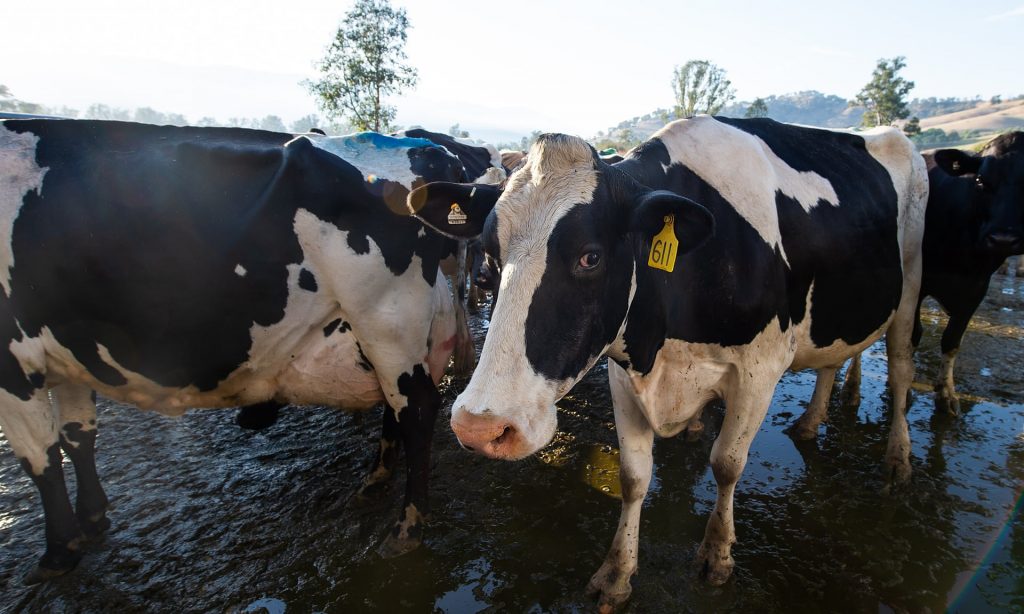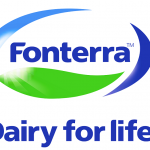
Five days after submissions closed on the final draft of the Australian dairy industry mandatory code of conduct, a confidential meeting was held in Canberra.
Representatives of dairy producers and processors met Coalition MPs after a $600m offer by China’s Mengniu Dairy to buy the already foreign-owned Lion Dairy processing business, which has fanned concerns about the overwhelming role of multinational corporations in the Australian dairy industry. Just a week earlier, the federal government approved the $1.5bn sale to Mengniu of the infant formula maker Bellamy’s.
Rabobank figures from June show about 77% of Australia’s dairy processing capacity is foreign-owned. But farmers have much more pressing concerns than who owns the processors.
“If we took foreign ownership out of the dairy industry we would have very few processors left in Australia,” says Graham Forbes, a dairy farmer.
The code of conduct was recommended by the Australian Competition and Consumer Commission and is intended to restore confidence and trust in an ailing industry after the collapse and international sale of Australia’s largest processor, Murray Goulburn.
A devastating cut in milk prices by Murray Goulburn in 2016, which was followed by other processors, led to farmers receiving just 10c a litre for the final few months of their annual contracts. It is one reason many farmers are not concerned about foreign ownership. It cannot be worse than Murray Goulburn.
Compounding the hurt is the drought which has left farmers in the irrigation-reliant districts of northern Victoria and inland New South Wales unable to pay for feed.
Forbes runs an 800-head dairy farm at Gloucester on the mid-north NSW and manages to grow 15 tonnes of fodder a day to support his herd. “It is only farmers’ lack of resilience at the moment, due to the long-term low milk price, that has put farmers in such a difficult situation,” he says.
Milk prices have rebounded to a record high, driven by scarcity of supply, but prices for grain and other feed are also at record levels. Margins remain very slight, says Forbes, who is also the president of the producers group Dairy Connect. They will only get tighter until the drought breaks.
Pressure for minimum milk price
A code of conduct was expected to return a sense of stability in this difficult period, but instead it has been roundly criticised. The draft as it stands fails to protect farmers from being locked into exclusive supply agreements and fails to protect against processors unilaterally varying milk supply agreements.
“The current draft of the mandatory code for dairy is deficient in a number of ways,” says Dairy Connect’s chief executive, Shaughn Morgan. “It’s so deficient that if it was to stay as it currently is we would say it should not be introduced.”
He would not say if he had been invited to the confidential Canberra meeting, but said the agriculture minister, Bridget McKenzie, was “very attentive” to concerns raised in an earlier meeting in Sydney in mid-November, and gave a “very strong indication that she understood those issues that needed to be addressed”.
McKenzie and the National party are under mounting pressure from the dairy industry to support a mandatory minimum price for milk to ensure farmers are paid at least the cost of production.
The Coalition voted against a recent private member’s bill from Pauline Hanson, whose One Nation party has gained a foothold in safe seats held by the LNP in Queensland and the National party in northern NSW, to establish a mandatory minimum price. Labor and the Greens supported the legislation, which fell one vote short in the Senate.
The Nationals have argued against the floor price proposal on the grounds that Australia’s trade partners would see it as a subsidy, and that it would not work in practical terms without re-establishing a quota system and undoing 20 years of deregulation.
“The National party focus has been lost,” says Forbes. “They used to be a party that represented farmers, and now they are just toeing the line of hard economics with the Liberals.”
The Nationals have focused on lobbying the major supermarkets, which earlier this year halted their nine-year stretch of selling milk for $1 a litre. Homebrand milk now sells for $1.20 a litre.
The ACCC found that an imbalance of power between processors and farmers, rather than $1 milk, was to blame for low prices to farmers.
But the Nationals have remained focused on supermarkets, with Queensland senator Susan McDonald calling this week for Coles and Woolworths to appear before a Senate committee.
McDonald said the code of conduct would be introduced with changes to remedy the farmers’ concerns about the power of processors by 1 January.
Rabobank’s senior dairy analyst, Michael Harvey, says the effect of $1 milk on farmgate milk prices had been “overemphasised” but it undoubtedly affected farmer morale.
‘A one-year vision’
Harvey says the Mengniu purchase of Lion could result in more investment in the industry, as Mengniu is likely to attempt to expand the export market. Exports account for about a third of the dairy market in Australia, down from two-thirds when the industry was regulated in 2000.
Harvey says exports have fallen because the size of the industry has shrunk since deregulation. The drought and the fallout from Murray Goulburn has led to another spate of farm exits and left a lot of excess production capacity.
There was an 8.4% reduction in the number of dairy farm licences issued in Victoria alone in 2018-19; 320 farmers left the industry in 12 months. Most were based in the flatland irrigation district of northern Victoria, around Echuca and Shepparton. The number of dairy farms nationwide has fallen by more than 2,700 in the past 10 years.
“There is a lot of excess stainless steel that would like more milk going through it,” Harvey says. “So that’s the first challenge for all dairy companies: stabilise the milk pool and try and support growth on farm and a recovery so you’re not just competing to grow your milk pool by pinching it off another company.”
Demand has pushed the milk solids price above $7 a kilo, a record for southern Australia, and made processors more likely to negotiate favourable contracts. For those dairy farmers lucky enough to escape the drought it is a good market.
One such is Stuart Crosthwaite, whose farm at Kergunyah South in the Keiwa Valley, just south of Lake Hume, is sports green grass. It has an average rainfall of one metre and while his winter rainfall was slightly below average, he is headed into a “normal year”.
But Crosthwaite is not negotiating with corporate processors. In 2017, when Murray Goulburn was bought by Canadian multinational Saputo, he and four others formed a small cooperative called Mountain Milk Co-Op. It now has eight members and has negotiated a three-year milk price with Freedom Foods, an Australian-owned processor at Shepparton.
It is a flat payment structure, unlike those offered by larger processors that work on a system of incentives and penalties.
“One of the biggest problems with milk prices is they will only give you a one-year vision,” Crosthwaite says. “And one of the hardest things is adjusting your farm when it goes up and down … [Now] we can act like normal people and run a business, and budget and plan ahead and invest with the confidence of knowing what we’re going to do.”

























